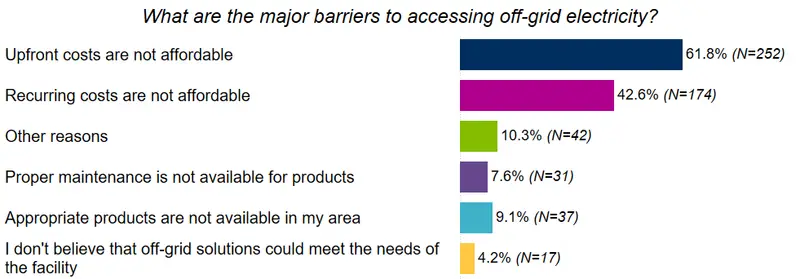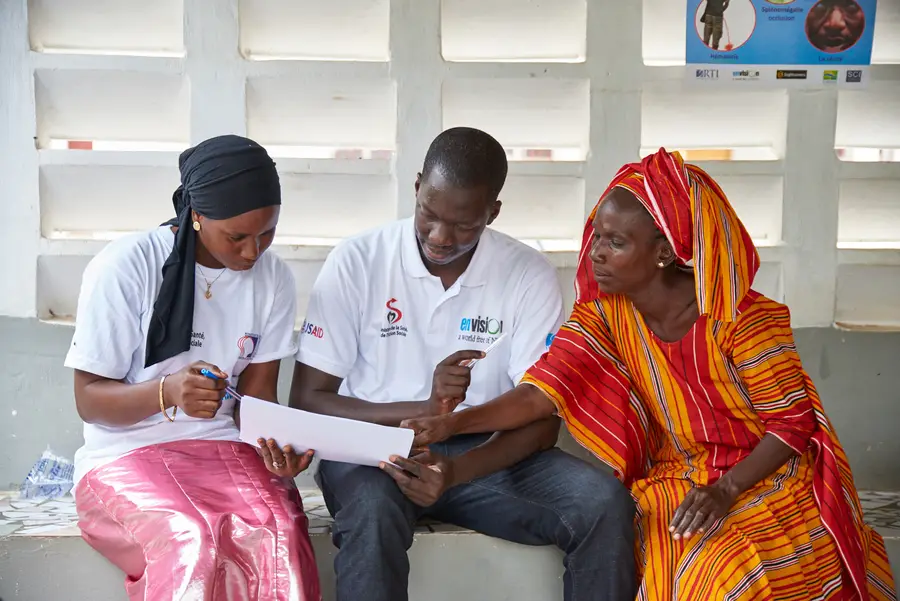Sam Phelps for RTI International
Across sub-Saharan Africa (SSA), approximately 60% of healthcare facilities are without electricity access. Without such access, healthcare providers face difficult and all-too-often dangerous challenges. Nurses spend hours on the back of a motorbike to pick up and then re-deliver vaccines from a facility that has a vaccine fridge. A midwife must deliver a newborn at night under shaky cell-phone light or by holding up a kerosene lantern. The lack of electricity restricts the ability of healthcare providers to record and track their patients, often limited to a pen and paper. Without access to clean and reliable electricity, these scenarios are the reality for far too many healthcare workers.
Despite a long-standing and clear need, there is limited data and information about the demand for and impact of healthcare facility electrification on health outcomes. To begin to shed light on the topic, using internal research funds, RTI developed and administered a regionally representative survey of health posts in Senegal. We found that 89.8% of on- and off-grid facilities would like to add additional off-grid electricity.
Although there is substantial demand, barriers such as upfront and recurring costs stand in the way (Figure 1). Simply put, both on- and off-grid health posts in Senegal want additional off-grid electricity but cannot afford to purchase the equipment and keep it in operation. The USAID-funded Power Africa Off-grid Project, which RTI implements, is working to develop private-sector business models that are affordable for healthcare facilities and include appropriate incentives to encourage long-term operation and maintenance of the systems.
Figure 1. What are the major barriers to accessing off-grid electricity?

Despite this ongoing donor-funded work, questions remain: What does electricity mean for health service delivery? How does reliable electricity affect health outcomes? Does reliable electricity attract and retain staff and lead to increased and improved service delivery? Does electricity at a healthcare facility lead to more vaccinations?
As RTI works to address the questions above through our research, there are still substantial data gaps around healthcare facilities’ electrification status and level. Both the global health and energy for development communities need surveys that connect the healthcare facility inventory with the patients they serve. We need case studies of current healthcare facility electrification efforts. We need randomized-controlled trials for pilot healthcare facility electrification interventions. Research in these areas will help move the discussion of healthcare facility electrification beyond a binary discussion on access and help governments and implementers of healthcare facility electrification develop frameworks for estimating the impact on health outcomes.
In the coming months, we will publish results from our research in Senegal to provide some answers to the questions above. We hope that this will spur a conversation and additional work in this important area. We look forward to collaborating with partners and colleagues across the health and energy sectors, putting our collective expertise together to investigate the connections between health service delivery and access to electricity. The more insights we can provide and questions we can answer on healthcare facility electrification, the more effective and efficient we will be in our efforts to power healthcare, strengthen health systems, and improve health outcomes. Together, we can better understand these connections to help ensure every health facility has the electricity it needs to provide quality health services to those in need.
Learn more about RTI’s work in Energy for Development and Health Systems Strengthening

